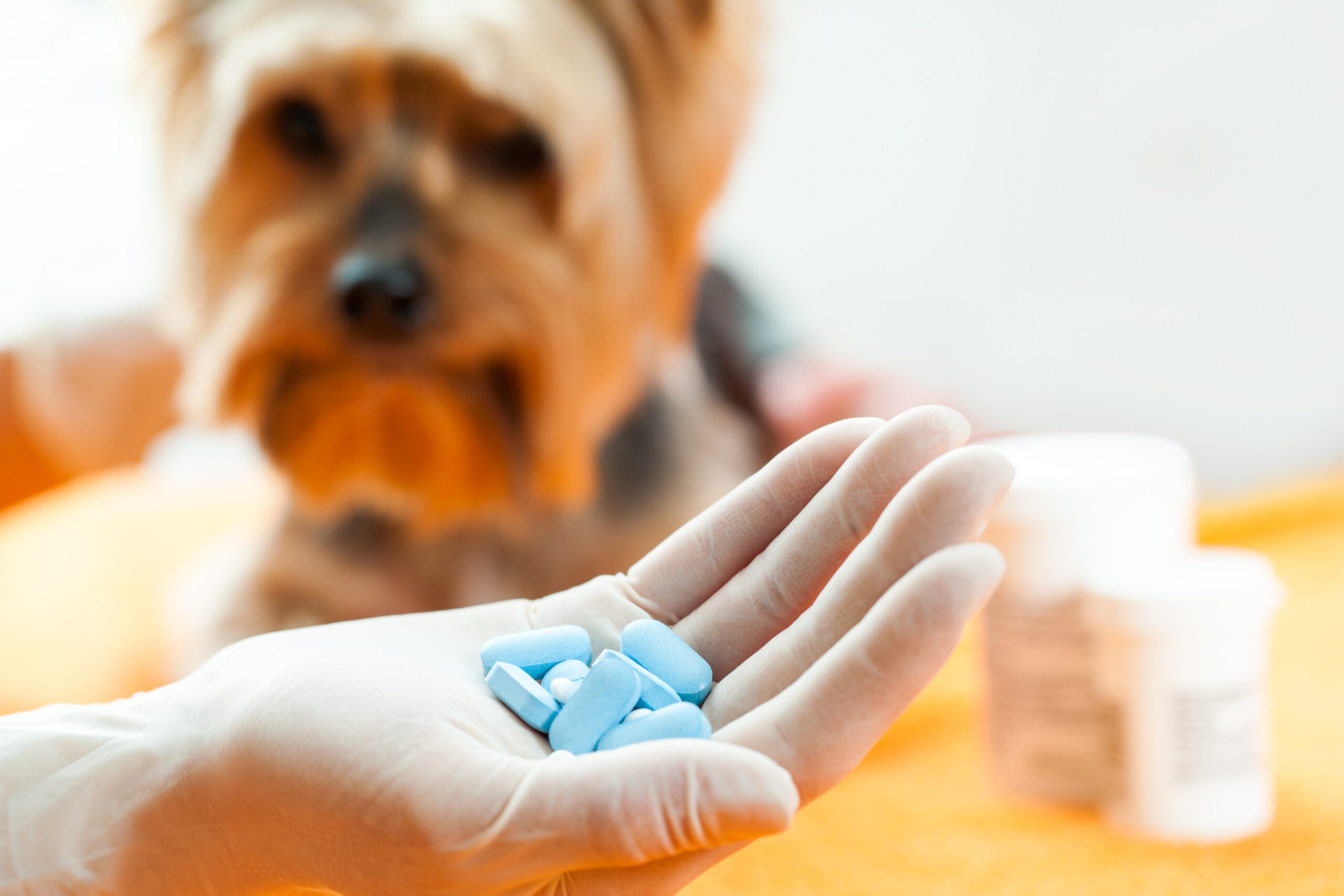Would you believe that almost half of the calls taken in by the Pet Poison Helpline are about the toxic effects on dogs of both human prescription and over-the-counter medications?
Most dog owners are well versed in the toxic effects of poisons such as grapes and raisins, xylitol, chocolate and onions, among many others. But what often goes unacknowledged is the very critical problem of when a dog ingests human medications. This works two ways – an owner unwittingly doses a pet with a medication, thinking it’s a good thing. Or second, a dog that finds its way into wherever the medication is kept. Consuming human medication can be dangerous to dogs so here is an overview of helpful information for pet parents.
Toxic Medications
The following are 12 human medications that are toxic to dogs with varying levels of danger. It’s important to remember that every second counts once you discover your dog has ingested a medication. Call the Pet Poison Hotline or reach out to your veterinarian for guidance on going to an emergency veterinary hospital for immediate treatment.
ACE Inhibitors
Used to treat blood pressure in humans, Zestril and Altace can cause low blood pressure and dizziness when ingested by pets.
Acetaminophen
Another pain-relieving medication for humans, this drug, known as Tylenol, is toxic for both dogs and cats. Since acetaminophen is approved for use with children, it may seem tempting to give it to your dog. Please do not this to your pets.
Albuterol
This commonly prescribed asthma medication comes in containers that are tempting to dogs because they look like a toy. Ingestion of albuterol results in rapid heart rate and agitation, followed by lethargy.
Antidepressants
Examples of harmful antidepressants include Effexor, Cymbalta, Prozac, and Lexapro. It’s true that vets prescribe antidepressants for some dogs, but the danger lies in overdosing. Signs of serious toxicity of these drugs include sedation, tremors, clumsiness, and seizures. Just one pill can lead to serious issues in dogs.
Aspirin
You may have been told to give your pet baby aspirin, but unless otherwise directed by your vet, don’t ever give your dog any kind of aspirin. Classified as being mildly or moderately toxic to dogs, it can still result in lethargy, stomach ulcers, and liver failure.
Benzodiazepines
Xanax and Klonopin are used by humans to calm the effects of anxiety and act as sleep aids. When ingested by dogs, some become agitated while others experience lethargy and clumsiness.
Beta-blockers
Unlike ACE Inhibitors, beta-blockers such as Tenormin, Toprol, and Coreg can cause serious damage when even small amounts are consumed by dogs. Toxic effects include dangerous drops in blood pressure and slow heart rate.
Birth Control
The ingredients in birth control pills – estrogen, estradiol, and progesterone – need to be ingested in hefty quantities to cause serious problems.
Cholesterol Medications
The most common brands in this category of medication are Lipitor, Zocor, and Crestor. Used frequently by humans, if ingested by dogs, causes mild vomiting or diarrhea.
Medications for ADD and ADHD
The common names for these medications are Concerta, Adderall, and Ritalin. Comprised of strong stimulants, including amphetamines, even in small quantities, these drugs can cause dangerous effects including tremors, seizures, increased temperatures, and heart issues.
NSAIDs
Commonly known as ibuprofen (Advil and Motrin) and naproxen (Aleve), these non-steroid, anti-inflammatory drugs and pain-relieving drugs can seriously affect your dog in quantities as low as 2 pills or capsules. The negative effects include stomach and intestinal ulcers as well as kidney failure.
Thyroid Hormones
Dogs sometimes also need thyroid medication, but interestingly, their doses are much higher than for humans. So, if your dog gets into your thyroid pills, it’s doubtful that any serious problems will occur but still reach out to your veterinarian for guidance.
Keeping Your Pup Safe
The critical piece to keeping your dog safe from all medications is how you store them. For maximum protection, follow these guidelines:
- Do not leave medications on your nightstand or on counter space.
- Put medicines away after every use and in a place that is out of sight and well out of your dog’s reach.
- Twist the top of the containers of your medications to ensure they are always locked.
- Tell your guests to make sure they store their medication so your dog cannot get to them particularly if they are staying over and have meds in their luggage or carry-ons.
- Ensure you have the telephone number of your vet and/or a poison control center in case your dog does find his way into a pill bottle.
Precautions and having safety measures in place is always key in keeping pets safe.







